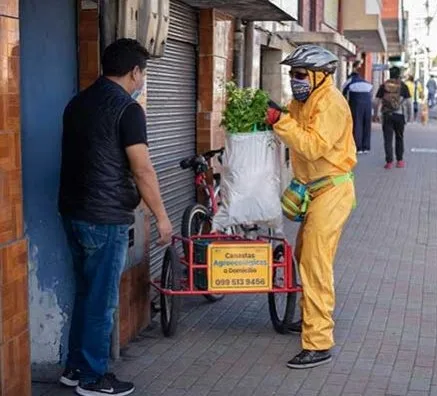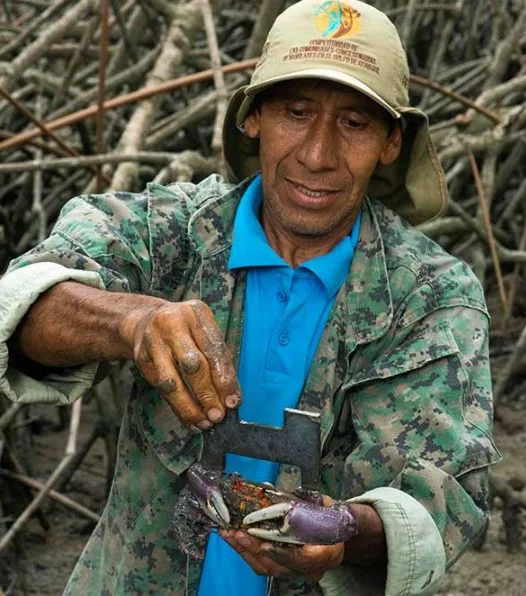Impact of Ecuador’s crises highlight the need for grassroots projects to protect the poor
By Surita Sandosham
The Covid-19 pandemic, protests by indigenous groups and El Niño flooding have landed devastating blows to poor  Ecuadorians who live in precarious situations. Add to these, the disruptions of recent drug gang violence affecting some areas of the country and it is easy to see the difficulty faced by those at the bottom of the economic scale.
Ecuadorians who live in precarious situations. Add to these, the disruptions of recent drug gang violence affecting some areas of the country and it is easy to see the difficulty faced by those at the bottom of the economic scale.
Farming families and communities, already struggling to earn a living income, have seen their entire food markets disrupted at various times. Crime and violence have made it dangerous and challenging to get crops, fish and meat to market, while growing insecurity also dampened consumer demand. Reports have reached us of women sleeping in their shops to protect their agri-food businesses.

Members of the Popular Arts Collective “La Changa” delivered of agro-ecological baskets on bike in Quito during the Covid-19 pandemic.
Yet against the odds, many communities are keeping local food supplies moving thanks to collaboration with local development groups that has strengthened their resilience to shocks, offering a blueprint for cost-effective, community-led economic development elsewhere.
Many rural communities in Ecuador were able to adapt to the effects of recent events with the support of organizations on the ground, including Heifer Ecuador, the Global FoodBanking Network and others. Grassroots efforts to minimize the impact of such crises have reduced the scale of losses and the cost of rebuilding as well as the imperative to migrate, making long-term resilience a strategic investment for the humanitarian and development sectors.
This picture of hope in Ecuador should inspire the international community to invest more funding and resources into strengthening local and rural economies in Latin America and around the world so that similar shocks do not set back development gains elsewhere.
Key to building long-term resilience is learning and applying lessons from previous natural disasters and man-made crises.
For example, at the height of the COVID-19 pandemic, farmers in Ecuador united to pool their produce at dedicated and sanitized collection centers and create food baskets for home delivery, targeting low-income families. Meanwhile, communities established open-air marketplaces with the help of the Heifer Ecuador team to provide farmers with a safe place to sell their produce during periods of restricted movement. This meant farming families could continue to make a living, while also supporting local food security.

Clemente Cáceres measures a crab collected during harvest season. Fishermen are permitted to take only male crabs that reach a preestablished size.
Today, farmers are applying the same flexibility and creativity to keep food markets functioning despite disruptions at key roads and ports. This includes adapting schedules to get key commodities like bananas, coffee and cocoa to ports safely.
A second element of long-term resilience is anticipating and preparing for shocks.
The 1997-98 El Niño brought extreme rainfall to Ecuador, resulting in agricultural losses of more than $300 million by February 1998 alone. But this year, ahead of a forecasted El Niño, Heifer Ecuador worked with partners to carry out an innovative study of the areas at most risk to help take preventative measures to reduce agricultural losses and damage.
The data analyzed the potential threat to 500,000 farmers and producers in the provinces of El Oro, Esmeraldas, Manabí, Santa Elena and Guayas, and recommended measures such as reinforced flood walls and barriers, improved soil drainage, and storage and processing for crops harvested early.
The result was that communities were better prepared this time with more information about what to expect. Some simple but key prevention actions were implemented to protect food collection centers’ post-harvest equipment, among others, minimizing the impact on food systems and local economies.
One such preventative action in El Oro province involved the co-financing of a canopy for a farmer-run association to cover and protect harvested cacao as it dried — an intervention that helped prevent the product from getting wet and losing its quality during rainy weahter. Similarly, in Santa Elena, Heifer Ecuador and local partners reinforced the soil around a meat processing center, channeling rainwater away from the center’s perimeter to reduce the risk of flooding and prevent the deterioration of the site’s infrastructure.
With more empowered, resilient communities, humanitarian aid can be better allocated for moments of unprecedented, urgent need.
In the meantime, vulnerabilities that exacerbate the impact of shocks — like the 7.8-magnitude earthquake that struck Ecuador in 2016, which killed hundreds and displaced thousands more — must be addressed through long-term disaster risk reduction, including improvements to infrastructure and early warning systems.
The effectiveness of responding to shocks like the recent violent conflict and climate extremes depends as much on the decisions taken in advance as it does those taken in the moment. And with climate extremes becoming increasingly frequent, investing in long-term resilience is even more critical.
By investing in local teams and working to strengthen the resilience of rural and agricultural communities at the bottom of the pyramid, the whole fabric of society is stronger and more stable as a result. This has benefitted Ecuador when it most needed it, and by replicating this model elsewhere, it can help protect the most vulnerable around the world.


















